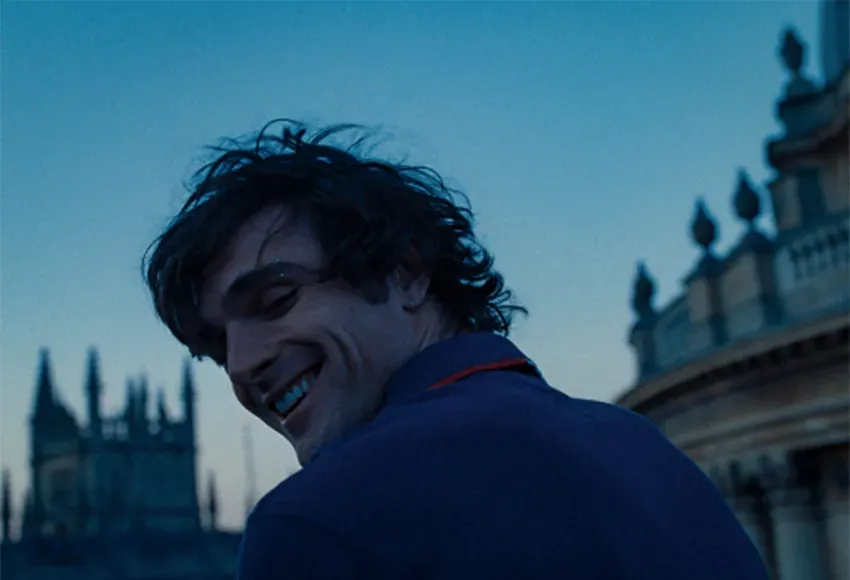SALTBURN
Theaters
Leave it to director Emerald Fennell to up the ante with her follow-up endeavor. A clever dramatic melding of Patricia Highsmith, Luis Buñuel, Peter Weir, Pier Paolo Pasolini, and Agatha Christie, Saltburn is a summer-break journey into bourgeois excess and sociopathic tenacity that wrapped its seductive tentacles around my throat and then spent 127 glorious minutes gently tightening its slithery embrace.
With the 21st century still taking its tentative baby steps into a fresh millennium, working-class scholarship student Oliver Quick (Barry Keoghan) has entered Oxford determined to make something of the opportunity. He is immediately infatuated with wealthy aristocrat Felix Catton (Jacob Elordi) and his gaggle of snooty, upper-crust friends. Oliver worms his way into the group, forging a friendship with Felix that could potentially overcome the obvious differences in their social and wealth statuses.
That's all prologue. The primary action takes place over summer break at Felix's family's countryside estate, Saltburn. It's like something straight out of Downton Abbey, complete with a devoted service staff, a massive hedge maze, antiques going back centuries, and a library filled with priceless classics straight out of Beauty and the Beast. It's all lorded over with perfunctory detachment by Felix's parents, Sir James Catton (Richard E. Grant) and the superficially sincere Elspeth Catton (Rosamund Pike), while the young man's entitled sister, Venetia (Alison Oliver), chain-smokes her breakfast and purposefully poorly conceals the requisite eating disorder.
Along with Oliver, other guests at Saltburn include Elspeth's best friend, the poor dear Pamela (Carey Mulligan); and distant family relation Farleigh Start (Archie Madekwe), Felix's best friend, who develops an instant distrust of Oliver. Days pass with everyone sunbathing on the estate, reading the final Harry Potter book (well before its release, of course), drinking heavily, and engaging in haughty small talk that's in reality much ado about nothing.
Oliver slinks around the estate like an overly observant vampire. There's something decidedly sinister about him, but considering how snobbishly bumptious the Cattons are, his shadily reptilian timidity doesn't appear nearly as dangerous or worrisome as it might otherwise. Oliver is our eyes and ears into life at Saltburn, the viewer's conduit to how they assess who he is, what he stands for, and whether or not he's the threat Farleigh believes him to be.
Elordi, right after making an unforgettable impression as Elvis Presley in Priscilla, is sex in physical form in Saltburn. Fennell allows cinematographer Linus Sandgren (Babylon) to use his camera like a voyeuristic weapon. If fawns over his sweaty frame, purposefully objectifying him in a manner such that we can hardly tell if it is Oliver lusting over his friend or instead us, the audience, doing it for him.
This is undoubtedly by design. Oliver's sexuality isn't important. Instead, it is what he does with it under the cover of night on the concrete steps of the estate or in the darkened quiet of a paramour's bedroom that matters. Whether he secretly lusts after Felix's affections or instead only wants others to think that is the case is a continual open question. Even when raw, unvarnished truths are slyly revealed, Oliver's true intentions remain a question mark. Even when answers are forthcoming, they still slink into a nebulous realm, stranded between reality, fantasy, and nightmare that's nothing more than a murder on a dance floor too posh for common folk to step foot upon without at least a moderate amount of subterfuge.
Fennell orchestrates the action as if she were making an adaptation of The Canterbury Tales crossed with an episode of The Crown, only to suddenly add a dash of Caligula, a pinch of Parasite, and a dollop of Ten Little Indians at the most unexpected of moments. It's mesmerizingly creepy and abhorrently sensual, usually at the exact same time, with Keoghan dominating the proceedings with a fervent introspective ghoulishness that's reminiscent of both his Oscar-nominated work in last year's The Banshees of Inisherin and his playfully cruel frivolity found in 2017's The Killing of a Sacred Deer.
I can't say more. Saltburn never plays it safe, and where Fennell takes things is guaranteed to anger a fair share of the viewing public. But the film's technical magnificence is never in doubt, and neither is the stellar work turned in by every actor in the talented ensemble. There's nothing discreet about the charms of the director's latest, and those open to its sexually and moralistically depraved virtues will find themselves in a paradise of ghastly mendacity where the apple and the serpent are one and the same.


